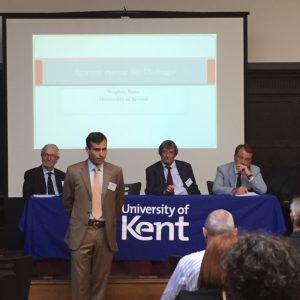It is a great pleasure to report that forty-two scholars from over a dozen European countries and one or two from further afield attended the Conference: The Price of Peace, Modernising  the Ancien Régime, Europe 1815-1848, hosted at the University of Kent Paris between 22-25 August 2016. The Conference, organised by the Centre’s Ambrogio Caiani (pictured), proved a great success.
the Ancien Régime, Europe 1815-1848, hosted at the University of Kent Paris between 22-25 August 2016. The Conference, organised by the Centre’s Ambrogio Caiani (pictured), proved a great success.
The post-Napoleonic age has always been regarded as a time of reaction and obscurantism. The very label Restoration implies a return to the past and reconstruction of traditional political structures. The conference very much sought to break with this sterile and unhelpful caricature. The world after 1815 simply could not wind the clocks back to 1789. Scholars from across Europe sought to show that the revolutionary and Napoleonic genie could not be put back in the bottle. This was a period of mass-experimentation in politics and society. After two decades of almost interrupted warfare European statesmen sought to demobilise their societies and economies. They created new constitutions, forms of representative government, invented academic history, new borders emerged, the public sphere expanded and village communities experienced a new lease of life. A delicate balancing act had to be established between the international settlement created at the Congress of Vienna and the demands of domestic politics and society. After the experience of the Napoleonic Empire the continent was more interconnected than ever before but the creation of new states meant that European peoples effectively rejected the systematic integration that the French Imperium had sought to impose. The problem of managing diversity in an increasingly international context, then like now, was the key issue that faced statesmen and diplomats. As the speakers showed, Spain, the Low Countries, France, Italy, Germany and Scandinavia all trialled different solutions to this problem. Moderation and compromise found their expression in the French concept of juste milieu (or middle ground). During the roundtable it was agreed that this period can draw much inspiration from post-colonial studies. It was felt that this was a supremely and uniquely post-Imperial moment in the story of Europe. The conference has been a great success and IB Tauris will publish its findings in a two volume collection entitled: ‘A History of the European Restorations.’ Available in all good book shops in late 2018.